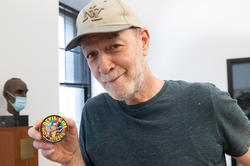Noted journalist and hip-hop documentarian Bill Adler gifts RISD his thousand-item collection of subversive comics and related ephemera.
Voices from the Archives

“Would you give the mystery of your forest, the fragrance of your flowers, the lulling music of your rivers for a creed that will not let you dance? Those words by Miss Helene Johnson—a Black poet writing in the teens of this century—ask an important question, particularly of artists. I’m going to examine that question using Black American poetry, which is so beautiful, so rich, so rarely cherished.”
The year was 1986, and the speaker was legendary author/activist Maya Angelou addressing a full house in the RISD Auditorium. Angelou’s lecture is one of hundreds now digitized and available for viewing as part of Fleet Library’s Digital Commons collection. Thanks to a $20,000 Libraries of Rhode Island (LORI) Grant, a team from across RISD Archives, Special Collections and Visual + Material Resources led by Dean of Libraries Margot McIlwain Nishimura and Digital Archivist Douglas Doe is working to rescue and preserve the recordings as part of a pilot program with the hope of eventually converting thousands of additional magnetic tapes currently stored in the RISD Archives.

“Angelou went on to tell everyone in the audience to go to the library and seek out poetry by Georgia Douglas Johnson, Anne Spencer and Paul Laurence Dunbar, which we loved,” says Nishimura. “It wasn’t a canned presentation but something she’d prepared specifically for RISD.”

Angelou’s is one of 10 lectures supported by the Andrew W. Mellon Foundation and delivered from 1982–87. The collection also includes such cultural giants as painters Leon Golub and Robert Irwin and writers John Updike and Fran Lebowitz. “It’s so interesting to see what was happening on campus 30 or 40 years ago and how those events sowed the seeds for RISD’s current strategic directions,” says Nishimura.
“It’s so interesting to see what was happening on campus 30 or 40 years ago and how those events sowed the seeds for RISD’s current strategic directions.”
Also available for viewing is the Arts and Humanities Lecture Series, which ran from 1987–90 and brought noted philosophers, historians, authors, critics and artists to campus, including composer Gunther Schuller, author Carlos Fuentos and illustrator Maurice Sendak. In his February 1988 talk, Sendak reflected on Dear Mili (Farrar, Straus and Giroux, 1988)—a passion project in which he illustrated a letter written to a young reader by Wilhelm Grimm (of the Brothers Grimm)—and spoke frankly about his practice.


“It is simply detestable to have to redo a drawing,” Sendak told students. “In the end you are thoroughly dependent on your own instincts and your editor, somebody you trust in the publishing house who is as driven and demented and messed up as you are.”
“In the end you are thoroughly dependent on your own instincts and your editor, somebody you trust in the publishing house who is as driven and demented and messed up as you are.”
In addition to these public talks, the pilot also features a series of interviews conducted in 1981 by then President Lee Hall. As Doe explains, the interviews took place at the New York offices of ad agency Needham, Harper & Steers as part of a never-realized plan to edit the tapes down into 10-minute segments for public television that would promote RISD’s educational mission. Included in the series are interviews with artist Robert Rauschenberg, longtime Vogue editor Diana Vreeland and iconic couturier Bill Blass.

“Fabric turns me on,” Blass tells Hall. “Synthetics are necessary but the luxurious fabrics—pure silk, wool, cotton and linen—really excite me. It has to do with touch as well as sight.”
The tapes are a godsend for current students, biographers and other researchers. And there is much more content on the horizon.
“It has been a great team effort to put this all together in very short order,” says Nishimura. “The grant is going to have a huge impact.”
—Simone Solondz
October 8, 2021


